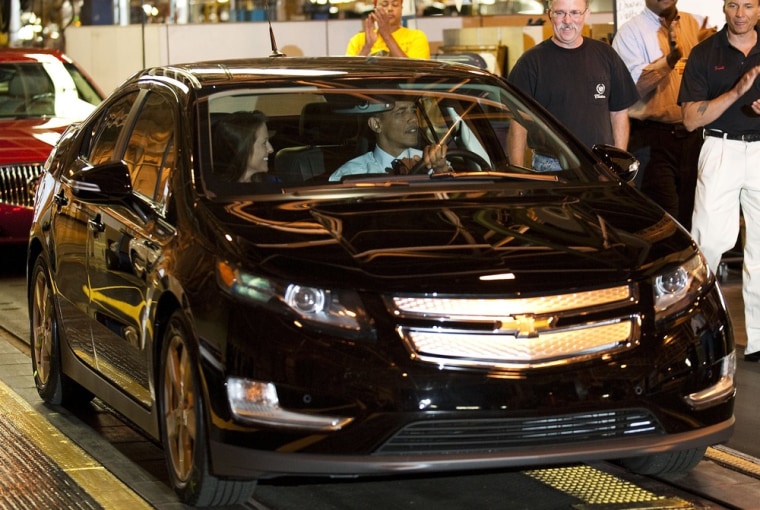The Chevrolet Volt has won a presidential endorsement and the support of leading environmental activists. Now it needs consumers' embrace when it comes to market later this year.
General Motors’ new extended-range Volt is just one of many advanced electric vehicles that will charge into showrooms over the next several years. Proponents believe the nascent switch to electric propulsion will be a critical step in reducing the nation’s dependence on foreign oil and toward the goal of reducing global warming.
But skeptics question the viability of vehicles like Volt, citing their high cost and limited range as factors that could minimize demand, especially at a time when gasoline prices are relatively affordable.
Analyst Joe Phillippi of AutoTrends Consulting said he was surprised by GM’s decision to price the Volt at $41,000, even higher than the $40,000 figure that had been floating among industry-watchers and at least 50 percent higher than a comparable well-equipped compact sedan using a conventional gasoline engine, like the new 2011 Chevrolet Cruze.
Other observers were less kind. Conservative talk show host Rush Limbaugh used the news to launch a tirade against GM, which he often refers to as “Government Motors,” suggesting the Volt will be a major failure. Commentators in mainstream media outlets including the New York Times also questioned Volt’s viability.
There’s no question the price tag is high, especially when compared with the other major battery car launch scheduled for late this year. The Nissan Leaf will come in just under $33,000. Like Volt, it will also be eligible for a $7,500 federal tax credit, which will bring the Nissan offering down to around $25,000, while Volt will have a transaction price of around $33,000 after the credit.
Lease expectations
Both makers expect to lease a significant number of their new battery cars, perhaps the majority of them. In that case, Nissan’s advantage largely evaporates, since both models will carry a lease price of $350 a month. That is perhaps a level that green-minded motorists could accept, suggested Phillippi.
“If they execute the car (Volt) as well as other recent offerings, they’ll be fine,” he said.
Indeed, despite the doomsday forecast of its skeptics, Chevrolet already is making plans to increase the production volume, which initially has been set at a quite modest 10,000 a year. The initial low production figure could create a familiar, if unwanted problem.
A spokesman for GM says the maker has “a couple of indications” that some dealers are planning to charge a premium on top of Volt’s already hefty price tag, assuming that early adopters will be desperate to get their hands on the vehicle. Even with the bump in production, a typical Chevy dealer is likely to only receive between four and six of the battery cars during its first year on the market. The factory has no direct control over what dealers charge, although there are subtle ways to discourage predatory pricing on hot products.
GM plans to ramp up production of the Volt steadily in subsequent years, with 45,000 units expected to roll off the line in the second year. Nissan is taking a similarly conservative approach to Leaf’s launch. It will initially be offered to fleet buyers, including about 100 Enterprise Rent-a-Car locations, which will permit the maker to test consumer reaction.
PHEV vs. BEV
The near-simultaneous launches of the Leaf and the Volt will give the industry a chance to see how potential buyers receive two very different approaches to battery power.
Volt, often referred to as a plug-in hybrid, or PHEV, is vaguely similar to current hybrid vehicles, such as the Toyota Prius, in that it combines a gasoline engine and electric drivetrain under one hood. There are a few key differences, however. Volt adopts a larger, lithium-ion battery pack which will allow it to drive up to 40 miles on electric power alone. And when it switches to gasoline its small four-cylinder engine will serve only as a generator, providing electricity to run the motor and never directly powering the wheels.
Leaf, on the other hand, is a pure battery-electric vehicle, or BEV, which is expected to get nearly 100 miles of range per charge. At that point, should it run out of power, it could be stuck without a place to plug in. Tony Posawatz, the head of GM's battery program, said Volt “overcomes that range anxiety.”
Whether that’s worth the higher price remains to be seen, but research shows there appear to be plenty of green-minded early adopters who will line up for both vehicles. The question, cautions Phillippi, is, “What happens when it’s time to appeal to the mainstream market?”
Part of the challenge will be educating the public on the advantages of specific battery-based products. GM says its dealers will work with potential customers to make sure Volt is right for them. Battery technology clearly won’t work for everyone. Volt will be best for those who use their vehicles primarily for short to midrange daily commutes or errands. Leaf won’t play well for those who regularly make long trips.
There is, of course, the basic question of whether either model will make financial sense.
Both GM and Nissan note they are working with select utilities around the country to develop reduced-rate charging policies that could yield energy costs of as little as a penny or two a mile, one-tenth the cost of gasoline power. But there could be sharp restrictions on when motorists could plug in their battery cars, most likely to overnight hours when utilities normally have plenty of excess power capacity.
Even at those prices, not everyone will come out ahead by switching to battery power, not at current fuel prices, anyway. But most experts anticipate that a global economic recovery eventually will push gasoline back over the $4 a gallon mark. And the higher it goes, the more charged up consumers are likely to get about electric vehicles.
